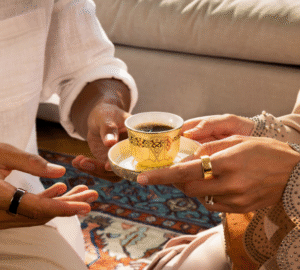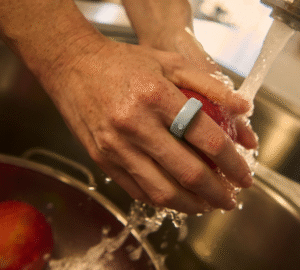A longtime Oura advisor and collaborator on research projects, Rebecca Robbins, PhD, is a Sleep Scientist at the Brigham and Women’s Hospital, Assistant Professor of Medicine at Harvard Medical School, and member of Oura’s Medical Advisory Board.
In her work, Robbins is dedicated to promoting the benefits of healthy sleep and empowering people to make positive changes in their sleep habits for better health and well-being. Her research has been published extensively in peer-reviewed literature and she has authored many book and encyclopedia chapters on sleep.
She is the co-author of the book Sleep for Success! Everything You Must Know About Sleep But Are Too Tired to Ask. Robbins frequently appears on national television shows.
In the Oura Q&A, Robbins shares the most common myths about sleep, her top tips to sleep well with a busy schedule, and the simple breathing technique she does before bed.
What brought you to Oura?
I am passionate about sleep as a viable, modifiable target for health behavior change. When we can make sleep a priority and improve our overall sleep health, it is remarkable how so many other aspects of health and well-being fall into place.
I met one of the founders of Oura in 2015 and was immediately intrigued by the Oura form factor for sleep monitoring and measurement outside the laboratory. Since then, we have collaborated on several research projects, including an investigation into how people make sense of their sleep data and how to communicate sleep and readiness information. We are working on a current study to explore sleep in comparison to gold standard measures of sleep (polysomnography).
RELATED: What Is a Polysomnography (PSG) Sleep Study?
What are some common misconceptions about sleep?
Myths about sleep are actually quite common and stem from multiple factors, including the simple fact that we never receive formal education about sleep in schools. Most of us learn about sleep from our parents, who may or may not have encouraged evidence-based sleep behaviors.
The fact that myths about sleep do persist in our society makes my work as a sleep scientist and advocate extremely fulfilling, because research my colleagues and I have conducted shows that thoughtful, evidence-based interventions to improve sleep can yield a dramatic benefit in terms of mental health, workplace productivity, and other factors.
For one, we have found in our research that many believe that it is a good thing to stay in bed even if you cannot sleep. Unfortunately, doing so puts you at risk for sleep difficulties. We encourage you to get out of bed when struggling to sleep, do something relaxing, and come back to bed when you are tired.
Another common myth is that sleeping in past your normal wake time helps you catch up on lost sleep. Unfortunately, different sleep-wake times from one day to another can confuse your internal circadian rhythm — it doesn’t know when it should release melatonin, the hormone that induces sleep. Instead, keeping a consistent sleep schedule will promote a healthy circadian rhythm and allow you to fall asleep faster.
READ MORE: Sleep Debt: Is It Possible to Catch Up on Lost Sleep?
As a sleep researcher and a mom, what’s your secret to sleeping well with such a busy schedule?
A few of my simple tips for staying on track for healthy sleep include:
- Being religious about my bedtimes and wake times, trying not to vary more than 1 hour
- Getting as much natural sun exposure as I can during the day
- Eating dinner early and avoiding eating 2-3 hours before bedtime
- Making time for exercise—people who exercise fall asleep faster and report better quality sleep than do those who do not exercise
- Managing stress and promoting my ability to fall asleep with simple meditation/mindfulness exercises at night
- Shutting off screens 30 minutes before bed and switching to a soothing bedtime routine, including a warm shower, reading a book, and talking to my husband about positive things from each of our days.
Now, I’ll be honest: these are my goals that I strive toward. However, I’m a busy academic and there are times when I have to push my bedtime later than I would like or skip my bedtime routine. There are also nights where my son is sick and wakes up in the middle of the night, which of course impact my ability to rest and adhere to my routine.
When these things happen (and they often do!) I try to take the night of poor sleep in stride, be mindful the next day about my alertness (taking naps if needed), and work to get back on track as soon as I can.
| Member Tip: When you sleep for 15 minutes or longer during the day, Oura will automatically detect your nap and adjust your daily Sleep Score and Readiness Score accordingly. |
Rapid-fire Round…
Must-do morning ritual?
Wake up, go for a run or walk with my dog and son, coffee, then start my day.
Go-to breathwork technique?
You can practice this simple breathwork exercise, called alternate nostril breathing, in a cross-legged seated position on the floor. Use two fingers (pressed together) against one of your nostrils as you inhale through the opposite nostril, then press that nostril closed as you exhale through the other nostril. Continue this: breathe in through one nostril, breathe out through the other, for several rounds. Then switch the circle of breathing so you inhale through the opposite nostril and so on. After a few minutes, with eyes closed, sit and breathe, trying to let your thoughts go to find peace in the present moment.
Mid-afternoon energy booster?
Walk in the natural sunlight. I try to avoid caffeine in the afternoon, although I would love another cup of coffee (one of my vices!). Natural sunlight in the afternoon gives you the same boost of energy without the risk of harming your sleep that night.
Surprising side interest or hobby?
I have for many years taught fitness classes. I only have the time to teach here and there, but when I do, I love it. There is something so rewarding about helping people connect with their bodies and releasing stress through fitness.
RELATED: Your Oura Activity Score











